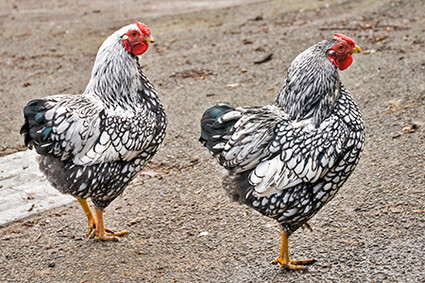Flu outbreak sparks alert over backyard chickens
Last updated 7/19/2022 at Noon
On July 12, the Oregon Department of Agriculture (ODA) and the U.S. Department of Agriculture’s Animal Plant Health Inspection Service (USDA APHIS) confirmed the state’s fifth detection of highly pathogenic avian influenza (HPAI) in a non-commercial flock in Deschutes County. The affected flock included approximately 30 chickens, 40 ducks, and geese.
Since the owners sold their eggs to the public, USDA classified the birds as a poultry flock rather than a backyard flock, meaning a regional quarantine is demanded. Additionally, federal and international disease control protocol requires the state veterinarian to issue a regional quarantine. The purpose of the quarantine is to prevent the movement of poultry and poultry products from within the affected area, giving state and federal officials time to conduct surveillance to ensure no additional cases of HPAI exist.
Avian influenza refers to disease in birds caused by infection with avian (bird) influenza (flu) Type A viruses. Avian influenza A viruses have been isolated from more than 100 different species of wild birds around the world. These viruses occur naturally among wild aquatic birds worldwide and can infect domestic poultry and other bird and animal species.
Wild aquatic birds include waterbirds (waterfowl) such as ducks, geese, swans, gulls, and terns, and shorebirds, such as storks, plovers, and sandpipers. Wild aquatic birds, especially dabbling ducks, are considered reservoirs (hosts) for avian influenza A viruses.
Wild aquatic birds can be infected with avian influenza A viruses in their intestines and respiratory tract, but some species, such as ducks, may not get sick. However, avian influenza A viruses are very contagious among birds, and some of these viruses can sicken and even kill certain domesticated bird species, including chickens, ducks, and turkeys.
Avian flu has spread to locations in the Willamette Valley. In May, the disease was detected in backyard poultry in Linn County. A few weeks later, several Canada goslings at Eugene’s Alton Baker Park tested positive for avian flu. Officials say that was the first finding of the highly pathogenic illness in wild birds in Oregon.
It all began on May 17 in Lane County. The USDA confirmed a case within a 500-bird backyard flock, according to inspectors.
Michelle Dennehy with Oregon Department of Fish & Wildlife said they’ve also found it in an osprey and a red-tailed hawk in the Eugene area.
Officials are asking people not to feed wild birds for now. That can encourage birds to congregate, thereby potentially increasing the spread of the disease. Waterfowl typically carry the virus, but it can also infect the birds that prey on or consume sick or dead waterfowl.
With avian flu cases still spreading in wild birds in the Willamette Valley, wildlife rehabilitation centers can no longer accept sick or injured waterfowl. The Oregon Department of Fish and Wildlife (ODFW) is asking anybody who sees sick or dead wild waterfowl not to intervene, but instead to report it to the local ODFW.
The continuing spread of the virus among birds in the Willamette Valley has been a difficult time for veterinarian Ulrike Streicher and other staff members at the Cascades Raptor Center in Eugene.
Last month roughly a quarter of the 40 red-tailed hawks brought in showed symptoms of the disease and had to be euthanized, since there is no way to treat it, Streicher reported.
“I know it’s important for containing the disease and particularly also protecting other birds in our care, but at the same time it’s totally heartbreaking,” she said.
While avian flu is very contagious and is deadly for some birds, the risk to humans is low, according to the U.S. Centers for Disease Control and Prevention. Avian influenza does not affect poultry meat or egg products, which remain safe to eat. As always, both wild and domestic poultry should be adequately prepared and cooked, health officials caution.
The Deschutes quarantine encompasses the city of Bend and much of the outlying area. The ODA provides an online map of the quarantined sites in Oregon. People may also enter their address using the online tool to determine whether their property is included in the quarantine area. The ODA will lift the quarantine as regional surveillance is completed.
The local quarantine also applies to importing all birds from states where a state or federal quarantine is in place.
In partnership with the ODA, USDA humanely euthanized the birds on the local property to prevent the spread of the disease. Birds from the flock will not enter the food system.
Wild bird enthusiasts wonder if they should take down backyard feeders. Since songbirds very rarely catch the illness, experts say there is no need.
“Veterinarians tell us there is very low risk to native songbirds from the highly pathogenic avian influenza strain,” said Dana Sanchez, Oregon State University Extension Service wildlife specialist. “At this time there is no official recommendation to take down wild bird feeders. We still recommend that everyone practice good everyday hygiene for the wild birds by regularly cleaning feeders and birdbaths because of salmonella, mold, and the ‘everyday’ health concerns that we can combat with regular cleaning of surfaces that get a lot of use.”


















Reader Comments(0)